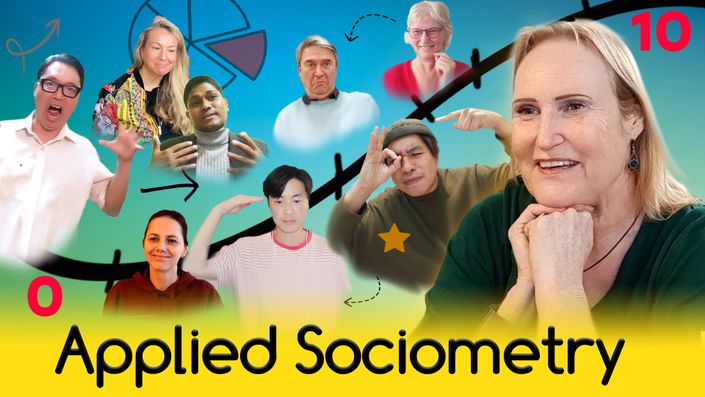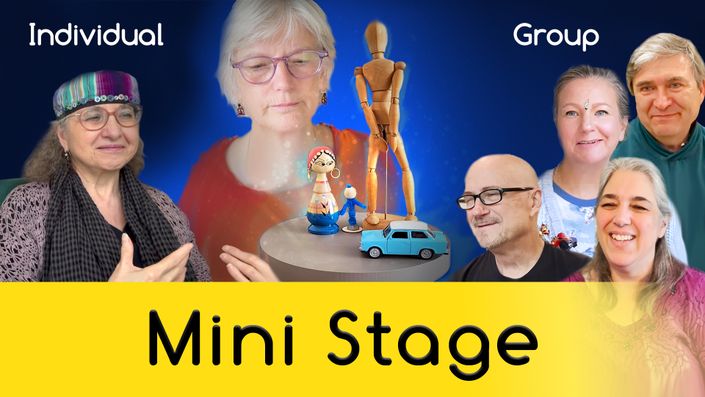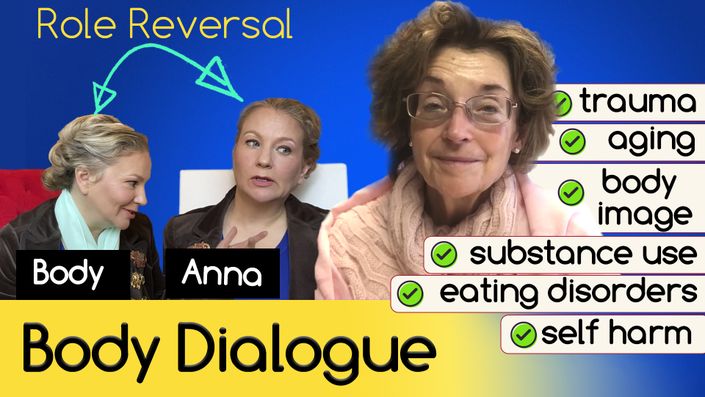Applied Sociometry. Module 6: Special Applications
In this closure module, effective techniques for concluding sociometric work are demonstrated, including practicing sociometry exercises that can be applied with groups. Practical examples of facilitating meaningful endings are presented, using interactive methods to help participants process their experiences, reflect on insights, and transition out of the session feeling seen and connected. Course led by expert Jacomien Ilbrink-de Visser from the Netherlands, CP, PAT (TEP in training).
$60 (One Module) - 100 days access
Countries of resedence are grouped into pricing Bands A–D, offering 30–70% discounts, applied to all modules and courses. Find your band here.
About the Course:
Sociometry is a quantitative method for measuring social relationships. Developed by Jacob L. Moreno, it involves analyzing the patterns and structures of social interactions within a group. Sociometry aims to uncover the underlying social connections, such as friendships, alliances, and conflicts, by mapping out the preferences and choices individuals make regarding their relationships with others. This approach is often used in psychology, sociology, and organizational studies to improve group dynamics, enhance communication, and resolve conflicts.
In this module, a variety of sociometric techniques are demonstrated to help facilitators create and adapt their own sociometric exercises for the specific groups they work with. The module explores the Doubling, Mirror, and Role Reversal Phases, showcasing how these developmental stages can be applied to deepen group connections and resolve conflicts in various settings, including group therapy, schools, families, and professional environments. Through practical demonstrations, viewers will see how to assess group dynamics, warm up participants, and facilitate sociometric exercises that enhance engagement and insight. The module concludes with closure techniques, ensuring that participants leave feeling grounded, connected, and ready to integrate their experiences.
Join an exciting transformative journey with 9 professionals—therapists, counselors, and coaches—from the US, Netherlands, Spain, Nepal, Latvia, Hong Kong, and Malaysia. Guided by instructor Jacomien Ilbrink-de Visser, CP, PAT (TEP in training).
This module is designed for:
• Therapists
• Social workers
• Counselors
• Educators
• Coaches
• Community leaders
• Researchers
• Criminal justice officers
• New to action methods
• Experienced practitioners seeking to expand their skillset
• Students in mental health fields
• Professionals interested in applying sociometry techniques in their work.
Appropriate for those who are new to action methods, as well as experienced practitioners, students in mental health fields, and those who want to develop their skills in action methods.
Learning Objectives:
• To demonstrate how to create and adapt sociometric exercises tailored to specific group settings, incorporating the Doubling, Mirror, and Role Reversal Phases to enhance group cohesion and insight.
• To showcase effective closure techniques that help participants process their experiences, strengthen connections, and transition out of the session with clarity and integration.
Module highlights:
• Advanced Sociometric Techniques: Explore how to design and adapt sociometric exercises based on the Doubling, Mirror, and Role Reversal Phases, enhancing group engagement and self-awareness.
• Facilitation Skills: Gain insights into leading sociometric encounters with practical applications in schools, family settings, and professional environments.
• Practical Application: See how closure techniques like Step in Circle help participants integrate their experiences and transition out of sessions effectively.
How and where to use:
In Education, for:
• Classroom Dynamics
• Bullying Prevention
• Conflict management
• Building relationship
In Organizational Development, for:
• Team Building
• Change Management
• Conflict resolution
In Therapy and Counseling, for:
• Group Therapy
• Couples and Family Therapy
• Substance Use Counseling
In Community Development, for:
• Community Building
• Conflict Resolution
In Health and Social Services, for:
• Patient Care
• Social Work
In Research, for:
• Social Science Research
In Criminal Justice, for:
• Rehabilitation Programs
• Gang Dynamics
Presenter:
Jacomien Ilbrink-de Visser from the Netherlands, CP, PAT (TEP in training). Jacomien received her training in psychodrama in New York City, where she mastered the application of explicit sociometry, also known as hand-on-shoulders sociometry. Over the past decade, she has specialized in teaching sociometry to clinicians, coaches, and educators in Europe, developing a structured approach to its safe application using Moreno’s developmental theory as a guideline.
Module Includes:
Main Content:
• Videos - 120 min
• Handouts - 10 min
• Test - 30 min
• Course Survey - 5 min
Recommended Content:
• Practicum - 75 min
Hours for Certificate:
• 4 training hours on the Action Explorations Education Certificate. Our courses may be applied toward professional certification/training hours, depending on your board’s policies. Please verify eligibility with your certifying board or primary trainer. We’re happy to connect and answer questions about course content, hours, and documentation. Reach out anytime with your questions.
Module Curriculum
Recommended Videos Not Included in Total Hours for Certificate
- Video 1. Group Assessment. Warm Up. (14:55)
- Video 2. Group Conflicts. Work in Schools and with Family. (19:39)
- Video 3. Practicing Sociometry. Part 1. (17:42 min)
- Video 4. Practicing Sociometry. Part 4. (15:09 min)
- Video 5. Doubling Phase. Saying Goodbye. Spectrogram & Action Sociogram (15:48 min)
- Video 6. Mirror Phase. Spectrogram & Action Sociogram. (14:27 min)
- Video 7. Role Phase. Spectrogram & Action Sociogram. (10:01 min)
- Video 8. Role Phase. Step in Circle and Action Sociogram (7:27 min)
- Video 9. Closure. Step in Circle. (5:58 min)




